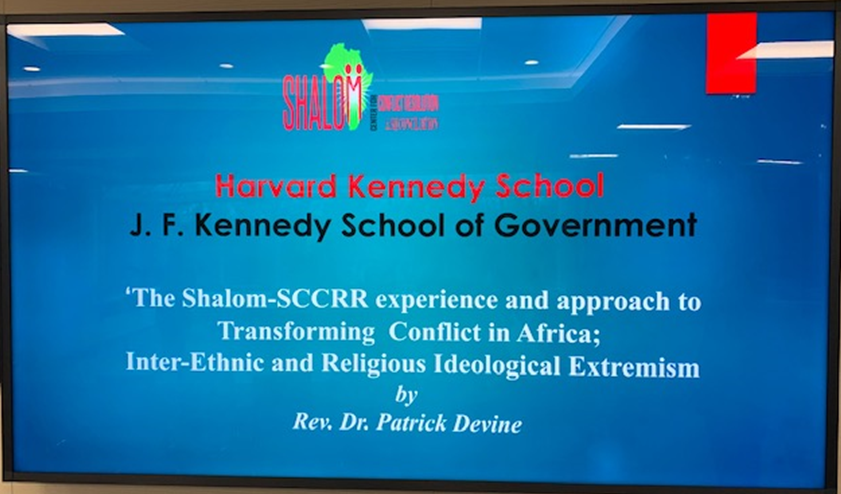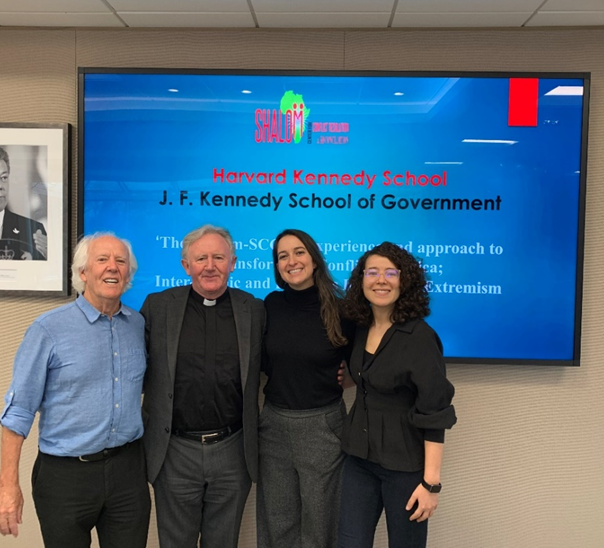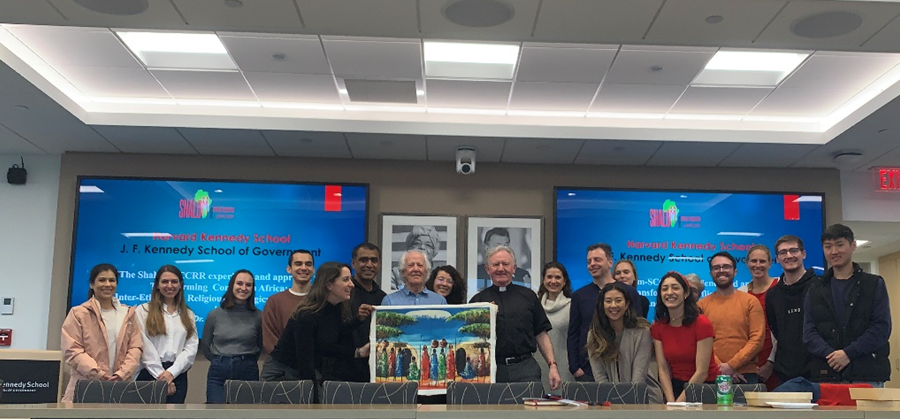By: Esther Kibe MA,
Rev. Dr. Patrick Devine recently gave a presentation at the Harvard Kennedy School, J. F. Kennedy School of Government, in Cambridge, Massachusetts, USA on November 16, 2022. The title was The Shalom-SCCRR Experience and Approach to Transforming Conflict in Africa: Inter-Ethnic and Religious Ideological Extremism.

Fr. Devine is the founder of the Shalom Center for Conflict Resolution and Reconciliation, an inter-religious organization with a highly qualified team pioneering conflict resolution and sustainable development work in conflict zones of Eastern Africa. Hosted by the Negotiation and Conflict Resolution Collaboratory at Harvard’s Center for Public Leadership and moderated by faculty member Hugh O’Doherty, the presentation outlined Shalom Center’s vision, mission, perspectives and methodology in working towards a society free of physical violence and unjust social structures in Africa. During his 90-minute presentation and questions and answers session, a variety of issues and perspectives were discussed concerning the underlying causes of conflict and its persistence, conflict transformation and peacebuilding in Africa. Additionally, the discussions also addressed issues in the Middle-East, Ukraine/Eastern Europe, Northern Ireland, Asia-Pacific, non-violent extremism in democratic states and the strengths and weaknesses of international institutions in preventing and countering manifest and structural violence around the world.

The Shalom Center conducts rigorous research on the underlying causes of inter-ethnic conflicts and religious ideological extremism. Interventions to transform, settle, resolve and reconcile conflict from manifest violence to negative peace initially and then onto positive peace centers on empowering grassroots local opinion-shapers to be the architects of their own independent future and reconciled co-existence. Due to appalling issues of gender violence in densely populated impoverished urban settlements (slums) Shalom has recently opened the “Shalom Empowerment Center addressing violence against Women and Children”.
In the opening and welcoming remarks, Monica Giannone and Hugh O’Doherty shared on the interventions and the accomplishments of Fr. Devine and the Shalom-SCCRR team in Africa. They pointed out that, “he was honored with the International Caring Award, and that other notable recipients include the Jimmy Carter, Colin Powell, Bill Clinton, Mother Theresa, George Mitchell and the Dalai Lama. In addition, eight countries in Eastern Africa presented him with an Intergovernmental Authority on Development (IGAD) Award for his visionary contribution to peace and development in the region, as well as other conflict transformation profile acknowledgments since”.
To date, there has been wide-ranging peace dividends emerging from the organization’s conflict transformation-sustainable development interventions. Shalom, in liaison with the local influential opinion-shapers trained in conflict transformation skills and peacebuilding techniques, have established/rehabilitated/equipped a large number of inter-ethnic and inter-religious educational, medical, water and other inter-community development projects. Over 570 school development projects in 280 institutions in poor and marginalized conflict environments in Eastern Africa have been empowered by Shalom’s conflict transformation interventions and funding. Many more are currently in process depending on the peace road-maps unfolding in conflict zones where Shalom works.

Fr. Devine in referring to the mindset embedded in Shalom-SCCRR’s methodology of conflict intervention – transformation, peace building and social development projects – accentuated that theory without practice is empty, and practice without theory is blind. While discussing the contexts where Shalom works, he said that in “African conflict environments where people are killed, maimed and displaced persistently, social and religious values such as peace, truth, justice and mercy cannot take deep communal root; people cannot live normal lives in a milieu conducive to actualizing their potential. Neither can communities experience sustained development because periodically schools, hospitals, religious, industrial and formation institutions, etc., become inoperable or destroyed. We will be forever rebuilding/rehabilitating infrastructure/institutions if we do not address the underlying/root causes of conflict” (https://shalomconflictcenter.org/).
While referring to past and ongoing conflicts, Fr. Devine highlighted “the need for conflict transformation processes to give astute attention to conflict memory; it is resilient, robust, transgenerational and moored in culture. Unfortunately, conflict has a memory that is frequently contaminated and distorted with erroneous historical narratives and media reporting. Mendacious propaganda and demonization where practiced have calamitous consequences hindering, even preventing at times, the evolution of conflict transformation and peacebuilding processes; mendacious propaganda, demonization and hypocrisy where practiced have to be transformed if road maps to conflict settlement and resolution are to be achieved.”
While addressing the issue of religious ideological extremism and whether religion is an underlying cause of manifest conflict he addressed the perspective that when “religion becomes disproportionately preoccupied or energized by increasing quantitative institutional membership, to the detriment of qualitative spiritual transformation, the potential for it becoming a destructive factor in conflict generation escalates” (Devine, 2017).
Fr. Devine voiced his appreciation to all the Harvard Kennedy School faculty members and staff for their efforts and commitment in enabling this event to come to fruition. He also shared his pleasure to meet and interact with all the participants, offering his own and Shalom-SCCRR’s assistance to them as they continued their careers to bring about positive peace-reconciliation in conflict and war-torn locations throughout the world.
Going forward, Harvard Kennedy School and Shalom-SCCRR are already engaged in conversations concerning joint research projects and scholar/student/practitioner collaboration on numerous issues, such as climate change and conflict and sustainable peacebuilding processes.
Author: Esther Kibe MA, Shalom-SCCRR’s Communications Department.
Click on the links below for more elaborated details of Shalom-SCCRR’s work:
- Moran, M. (2022). Shalom Chairman delivers lecture at Harvard Kennedy School.https://www.indcatholicnews.com/news/46016
- Shalom-SCCRR. (2022). 2009-2021 Shalom-SCCRR Results and Achievements. https://shalomconflictcenter.org/2009-2021-shalom-sccrr-results-and-achievements/
- Prof. Wanakayi K. O. (2020). An understanding of the work of Shalom-SCCRR: https://shalomconflictcenter.org/wp-content/uploads/2021/02/AN-UNDERSTANDING-OF-THE-WORK-OF-SHALOM-SCCRR.pdf
- Shalom-SCCRR. (2022). 2021 Shalom -SCCRR Results and Achievements. https://shalomconflictcenter.org/2021-shalom-sccrr-results-achievements/
- Moran, M. (2020). Eastern Africa: Shalom-SCCRR receives United Nations (UN) Accreditation. https://shalomconflictcenter.org/3901-2/
- Devine, P. R. (2022). Conflict Transformation and Peace-Building across Eastern Africa: Chairman’s Report on Progress in 2021. https://shalomconflictcenter.org/conflict-transformation-and-peace-building-across-eastern-africa-chairmans-report-on-progress-in-2021/
- Erot P. (2017). BBC and Shalom-SCCRR Confer. https://shalomconflictcenter.org/bbc-and-shalom-sccrr-confer/
- Noonan, O & Kevlihan, R. (2018). Managing conflict in north-west Kenya: the siege of Loregon and its aftermath, Conflict, Security & Development, 18:2, 137-157, DOI: 10.1080/14678802.2018.1447862
- Shalom-SCCRR. (2022). Shalom Empowerment Center (SEC) Addressing Violence against Women and Children: Concept Document. https://shalomconflictcenter.org/eastern-africa-shalom-empowerment-center-sec-addressing-violence-against-women-and-children-concept-document/
- Moran, M. (2022). Shalom Empowerment Center opens in Nairobi, Kenya. https://www.indcatholicnews.com/news/45158
- Otsieno, J. & Kibe, E. (2022). Shalom Empowerment Center (SEC) Addressing Violence against Women and Children: A Unique Shalom-SCCRR Initiative Opened. https://shalomconflictcenter.org/shalom-empowerment-center-sec-addressing-violence-against-women-and-children-a-unique-shalom-sccrr-initiative-opened/
- Mwangi, F. (2022).Shalom-SCCRR Empowered Communities Sustaining Peace at the Kisumu-Nandi Borderline during the August 2022 Kenya’s General Elections. https://shalomconflictcenter.org/shalom-sccrr-empowered-communities-sustaining-peace-at-the-kisumu-nandi-borderline-during-the-august-2022-kenyas-general-elections/
- Devine, P. R. (2017). “Radicalization and Extremism in Eastern Africa; Dynamics and Drivers”, published in the Journal of Mediation and Applied Conflict Analysis, 4 (2): http://mural.maynoothuniversity.ie/9086/7/PD-Radicalisation-2017.pdf
- Lugonzo, F. (2018). Conflict transformation, Radicalization, and Extremism in Eastern Africa. https://shalomconflictcenter.org/conflict-transformation-radicalization-and-extremism-in-eastern-africa/
- Okoth, G. & Mwangi, F. (2022). Shalom-SCCRR Facilitates at AMECEA Forum on Addressing Religious Ideological Extremism in Eastern Africa. https://shalomconflictcenter.org/shalom-sccrr-facilitates-amecea-forum-on-addressing-religious-ideological-extremism-in-eastern-africa/
- Okoth, G. (2022). Shalom-SCCRR Mobilizes Intervention towards De-Radicalization and Counter-Violence Extremism on the Kenyan Coast. https://shalomconflictcenter.org/shalom-sccrr-mobilizes-intervention-towards-de-radicalization-and-counter-violence-extremism-on-the-kenyan-coast/
- Shalom-SCCRR.(2016). Harvard Lecture Focuses on Model for Peace. https://shalomconflictcenter.org/harvard-lecture-focuses-on-model-for-peace/
- Shalom-SCCRR. (2020). Shalom-SCCRR signs MoUs with The Senator George J. Mitchell Institute Queen’s University, Belfast, & Edward M. Kennedy Institute, Maynooth University. https://shalomconflictcenter.org/shalom-sccrr-collaborates-with-the-queens-university-of-belfast-edward-m-kennedy-institute-for-conflict-intervention/
- Watson, T. (2017). Fr. Patrick Devine and Shalom’s Methodology have Impact in Northern Ireland. https://shalomconflictcenter.org/fr-patrick-devine-speaks-out-on-conflict-resolution-and-peace/

